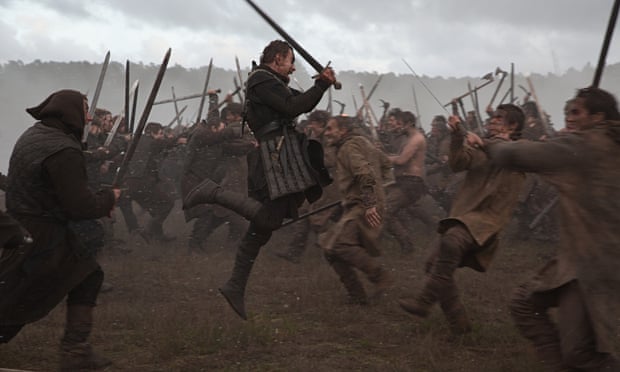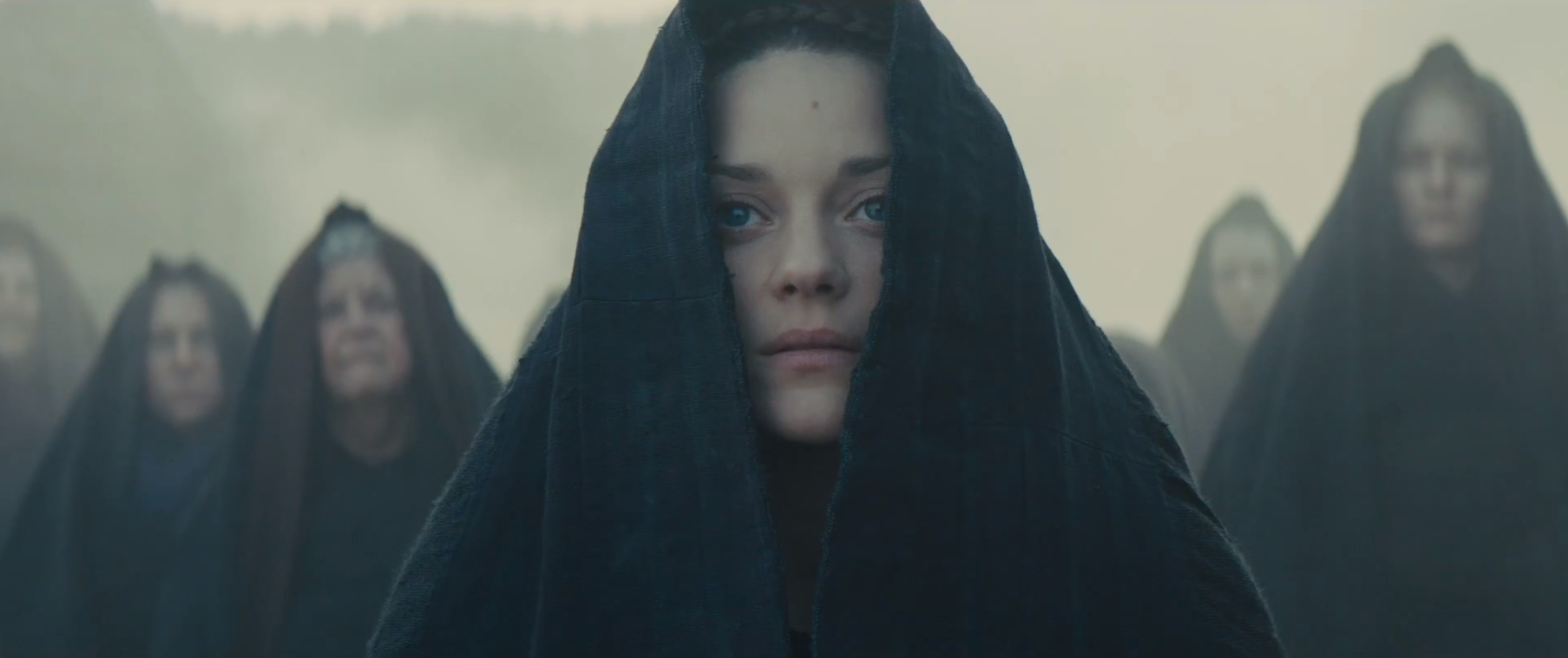Macbeth (2015)
Directed by Justin KurzelWritten by William Shakespeare, screenplay by Jacob Koskoff and Michael Lesslie
Starring Michael Fassbender (Macbeth), Marion Cotillard (Lady Macbeth), Paddy Considine (Banquo), Sean Harris (Macduff), David Thewlis (Duncan).
Macbeth (2015) on IMDB
Is this a triumph I see before me? Not quite, but Macbeth is certainly, in my eyes, one of the finest film adaptations of William Shakespeare’s famous play. Set in Scotland, in a heavily fictionalised simulation of the rise and fall an 11th century Scottish king, Shakespeare’s play needs no introduction. Despite being the shortest of his tragedies it is perhaps the most famous. Including genre transpositions (such as Akira Kurosawa’s Throne of Blood) and other forms of adaptation, Macbeth has been brought to screens large and small twenty-four times. So what makes this 2015 adaptation stand apart? You would think that with so many adaptations and so many different approaches to the play’s content, that Macbeth would simply retread old ground. You would be mistaken.
Macbeth is in many ways a very literal adaptation of the play, doggedly loyal not just to Shakespeare’s beautiful, poetic dialogue and soliloquies, but also to the emotions and motivations behind them. There is no better display of this approach than in the eponymous protagonist himself. Through Michael Fassbender’s wonderfully underplayed performance we see a man first quietly suffers the consequences of his actions, and then is led to believing his own lies, caught between his ethics and his desires. Macbeth is first caught in a conflict between his sense of morality and his duties to a noble king, and to the resplendent future promised to him by three clairvoyant witches. Fassbender internalises Macbeth’s pain, hidden behind a falsely calm facade, only beginning to burst through as he descends into madness later in the film. Initially, Macbeth cannot bring himself to murder Duncan in cold blood - he does not believe himself capable of murder - but over time he is sold his own lie, and allows himself to become more and more callous and cruel, and it is as he moves further down this dark path that Fassebender allows Macbeth’s facade to slip: when Macbeth sees the ghost of Banquo, and has an outburst of anger in the middle of his feasting hall; when ordering the deaths of Macduffs wife and children, and when he lights the execution pyre himself. It is a subtle emotional journey but not one that goes unnoticed, and while not exactly a virtuoso performance, it is one that I believe shows a deeper level of skill from Fassbender; where some actors might go over the top in portraying the throes of insanity, Fassbender brings a more human and beautifully low-key approach.
While faithful to the play in terms of content, Macbeth is also vastly experimental, yet not to a degree that it alienates the viewer. Kurzel’s use of montage editing during the opening battle sequence unglamourises and humanises what could have been a straightforward action sequence. We are brought to the battlefield alongside Macbeth, Paddy Considine’s Banquo, and a handful of other soldiers, and we stand beside them at every stage of the hellish nightmare that this battle becomes. In particular, our focus is drawn to a young soldier (played by newcomer Scot Greenan), who is implied to be partaking in his first battle. Tension rises, as the two armies of Scots race toward each other in slow-motion. Then the chaos begins, and our protagonists are lost in the low mist and a frenzy of near-silhouettes, and as Macbeth himself stands distracted by his first sighting of the witches, all around him, we are forced through slow motion to watch as both friends and enemies - including the young boy soldier - are painfully dispatched. This young soldier, seeing war for the first time, has his throat cut before the day is done.
Every blow and strike by soldiers on either side is with a raw energy that keeps this fight, despite its scale, a personal affair. We cut back to Banquo several times throughout but it is Macbeth’s perspective that provides the most visually interesting parts of the sequence, as halfway through, he becomes distracted by three enemy warriors who he sees as three hooded witches, a change in colour temperature (cutting to the witches in a putrid yellow from the bluish grey of the battle) dividing reality and irreality. The battle passes Macbeth by, and the level of disparity is signal through another clever use of slow and fast motion. The world turns and his soldiers fall, but Macbeth is singularly focused on these three unknown figures who he can palpably sense are somehow tied to his own fate.
Similarly, the final confrontation between Macbeth and Macduff takes place in the reddening smog of a burning forest, hiding everything but the two combatants from our sight and throwing a malicious red glow upon them, as if their battle takes place over the mouth of hell itself. It’s a wonderful visual metaphor considering the film’s use of religious imagery and the Macbeths’ complex relationship with their faith, and makes for a stylish and visually awe-inspiring, almost fantastical finale, reminiscent of the similarly hellish, crimson final frame of Red Sorghum (Zhang Yimou, 1987), which also showed war in an unpatronising and horrific way. Interestingly, this powerful blood-red is seen only in this scene, the opening titles, and in the murder of King Duncan; despite the amount of bloody violence and gruesome deaths, actual gore is generally kept to a tasteful minimum, used sparingly to retain its visual impact. Duncan’s murder is a turning point for the story, the moment when Macbeth takes fate into his own hands and physically sets himself on a path to ruin. The finale is of equal importance, as all of Macbeth’s mistakes become manifest, and he is punished for his moral failures. Justice is done, Macduff kills Macbeth, and leaves his body on the plains before Dunsinane Hill as a red sun fills the sky.
Despite all of this, I have one rather large criticism with the film, one that I found distracting to the point of actually degrading my experience of the piece: mumbling. Shakespeare’s writing is beautiful, and the film consistantly stays loyal to the original text. However, the beauty is in how it is heard, how it is performed, and yet even Fassbender is guilty of fumbling with many of his lines. The rhythmic intonation and delivery is there, but in many cases it is inaudible - often detracting from the emotional value of the characters’ speech, particularly in the cases of Marion Cotillard and Paddy Considine - and when the film is drawing so heavily from such a triumphant work of lyrical art, it just feels like, pardon the pun, wasted breath. Only a few scenes (such as the banquet hall, when Macbeth sees the ghost of Banquo) break this pattern, and when the film is already carried by characters with thick, Scottish accents, the sheer volume of mumbled lines makes large swathes of the story difficult to follow.
That’s my major criticism of this film, but unfortunately it’s a rather larger one that detracted considerably from my enjoyment of the film. It prevented me from becoming invested as fully in Lady Macbeth as I clearly should have been, which is a shame considering how wonderfully complex a character she is. That brings me to another criticism, which is that at times, the film moves a little too slowly, most noticably during a few of Lady Macbeth’s monologues. Marion Cotillard’s performance, particularly when she returns to her home village (which, now abandoned, has the air of cursed grounds) is moving and deftly portrays the character’s own personal tragic downfall, but the use of such long takes in already slow, plodding sequences detracted from said sequences as a whole; performance alone can only hold the audience’s attention so far. Film is a visual medium, and while a lot of it is reliant on the actors’ physical performances, cinematography, camera movement and intercutting are also essential in exploiting a film to its full potential. Long takes are great in moderation, and overuse of intercutting is far too common in modern cinema, but we sit in a room watching Lady Macbeth stare into space and talk to herself several minutes. Twice.
In conclusion, I think that despite being incredibly loyal to the source material, Macbeth is a surprisingly fresh and innovative take on the material. The visual style makes this, as a friend of mine described it, a “pretty” film, and the performances (where we can hear them) are richly layered and engaging, drawing us into a very personal experience.
8.5/10
There was room for improvement in the sound design department, and the pacing was a tad slow at times, but overall this was a fantastic exploration both of Shakespeare’s tragic characters and of visual form. I would highly recommend seeing this film in its entirety, since its visual style is one of its greatest achievements. The other? Well, it’s no surprise to me that Michael Fassbender was nominated for Best Actor at the British Independent Film Awards. He poured his soul into Macbeth, and more than deserves the recognition for it.


